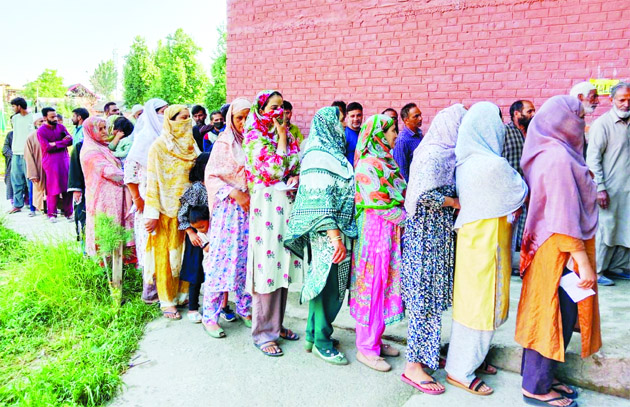Sapna Kotwal
The Lok Sabha elections of 2024 marked a significant milestone in the democratic journey of Jammu and Kashmir. With the region witnessing a remarkable increase in voter turnout, the Systematic Voters’ Education and Electoral Participation (SVEEP) initiative played a pivotal role in this transformation. Extensive efforts and innovative strategies underpinned our success.
One of the cornerstones of the SVEEP campaign was comprehensive voter education. We recognised that an informed electorate is essential for a robust democracy. Our efforts focused on educating voters about their rights, the electoral process, and the importance of their participation. We organised workshops, seminars, and interactive sessions across urban and rural areas, ensuring that no community was left out.
Given the linguistic diversity, voter education materials were developed in multiple languages, including Urdu, Kashmiri, Dogri, and Hindi. This ensured that the message reached every corner of the region, breaking down language barriers.
Leveraging the power of social media and digital platforms, we launched campaigns on Facebook, Twitter, and Instagram. These platforms allowed us to engage with younger voters, providing them with information on the importance of voting and the procedures involved.
Understanding the unique demographic and geographical challenges of Jammu and Kashmir, we designed targeted outreach programs. These included the engagement of youth. With a significant portion of the population being young voters, we collaborated with educational institutions to conduct mock elections, debates, and quiz competitions helped foster a sense of civic responsibility. These events were designed to be both informative and engaging, ensuring active participation from the youth. This not only educated young voters but also ignited their enthusiasm for participating in the electoral process.
Special focus was placed on encouraging women’s participation. We launched the ‘Sashakt Nari, Sashakt Matdata’ (Empowered Women, Empowered Voter) campaign, which included door-to-door campaigns, women’s rallies, and the establishment of Pink Polling stations or all-women polling stations to ensure a safe and comfortable voting environment.
We made concerted efforts to ensure that Persons with Disabilities (PwDs) could participate without any hindrance. This included the provision of accessible polling stations, transport facilities, and sensitisation of polling personnel.
Harnessing the power of media and technology was crucial in our outreach efforts. We utilised social media platforms, local television channels, and radio to disseminate information and engage with voters. Interactive social media campaigns, such as ‘My Vote, My Voice’ saw high levels of participation and significantly raised awareness.
Collaboration with civil society organisations amplified our reach and impact. Community leaders, and local influencers played a vital role in mobilising voters. Their on-ground presence and trust within communities helped in addressing apathy and misinformation.
We established Electoral Literacy Clubs (ELCs) in schools and colleges, which served as continuous engagement platforms. These clubs not only educated students but also involved them in peer-to-peer campaigns, ensuring a ripple effect of voter education.
We also appointed Campus Ambassadors in colleges and universities to spread awareness about the electoral process. These ambassadors played a vital role in motivating first-time voters and addressing their queries.
Special provisions were made for senior citizens, including the availability of seating arrangements and assistance at polling stations. This helped in encouraging higher turnout among elderly voters.
Innovative campaigns tailored to the cultural context of Jammu and Kashmir were instrumental. For example, we organised ‘Matdata Mahotsavs’ (Voter Festivals) which included cultural programmes, street plays, and local art forms to convey electoral messages. This approach resonated well with the local populace, making the message of voting both entertaining and educational.
Given the unique security concerns in the region, ensuring a safe and secure environment for voting was paramount. We worked closely with security agencies to build trust and assure voters of their safety. This effort was crucial in encouraging voter turnout, especially in sensitive areas.
SVEEP activities also focused on ensuring that marginalised communities were not left behind.
Special camps were organised in remote and difficult-to-reach areas to educate and enrol voters. Mobile vans equipped with information and registration facilities travelled to these regions, ensuring no one was disenfranchised due to geographic challenges.
We launched motivational campaigns featuring local influencers and respected figures who urged the public to exercise their voting rights. These campaigns were particularly effective in building a positive narrative around voting.
SVEEP campaigns across J&K also focused on sports activities like water rafting on the River Lidder in Pahalgam, skiing on the powdery snowy slopes of Affarwat, and horse riding amid rain in the picturesque locales of Betaab Valley.
We set up feedback systems where voters could share their experiences and suggestions. This real-time feedback helped us to make necessary adjustments and improvements.
A dedicated voter helpline provided assistance and information, addressing any electoral issues faced by voters swiftly.
The impact of these SVEEP activities was visible in the voter turnout. Compared to previous elections, there was a significant increase in participation across all demographics. The 2024 Lok Sabha elections in Jammu and Kashmir not only saw a higher turnout but also more informed and enthusiastic voters, reflecting a vibrant democratic engagement.
I particularly thank the voters of Jammu and Kashmir for the enthusiasm they showed during the entire electoral exercise and their participation in the festival of democracy.
The success of the SVEEP initiative in Jammu and Kashmir is a testament to the power of systematic and inclusive voter education. By addressing the unique challenges of the region with targeted strategies and innovative approaches, we were able to significantly boost electoral participation. As we move forward, the lessons learned and the foundations laid during these elections will continue to strengthen our democratic processes and empower every citizen of Jammu and Kashmir.
(The author is JKAS and Secretary Advisory Board for the Development of Pahari-Speaking People. She is also the
Nodal Officer Media, Chief Electoral Office, J&K,
looking after all SVEEP activities of J&K.)


